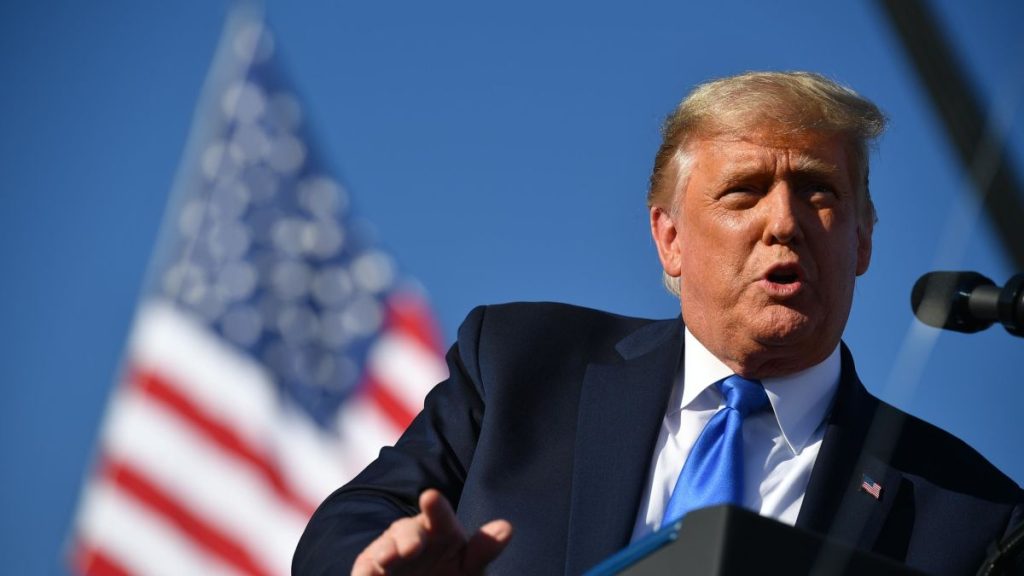
As the election approaches, former President Donald Trump is ramping up his familiar strategy of disinformation to gain political traction. Amid the backdrop of Hurricane Helene and other impending storms, Trump is making unsubstantiated claims that the Biden administration is diverting disaster relief funds to unrelated migrant programs. This accusation is particularly ironic given that during his own presidency, Trump repurposed FEMA funds to support his strict immigration policies.
Trump has repeatedly asserted that his legal troubles are a result of Democratic election interference, despite his own attempts to overturn the 2020 election results. He has warned voters in Wisconsin that if he loses in November, “Some people say you’ll never have an election again,” a statement that raises concerns about his views on democracy.
In a recent radio interview, Trump targeted Vice President Kamala Harris, alleging that “everything she says is a lie.” While it’s not uncommon for politicians to exaggerate, Trump’s penchant for outright falsehoods is particularly alarming. For instance, he previously claimed that Haitian migrants were “eating the pets” of Springfield residents, a statement that has no basis in fact.
This pattern of misinformation is evident in Trump’s discussions about the Biden administration’s response to recent hurricanes. He has falsely asserted that federal aid has been unfairly distributed, neglecting victims in Republican areas and claiming that Biden has not responded to calls from Georgia’s Republican governor. In reality, the $750 initial payment offered to disaster survivors is intended to cover basic needs, and applicants can receive significantly more for home repairs.
Harris criticized Trump for spreading “disinformation” regarding the aid available to Hurricane Helene survivors, stating, “It’s extraordinarily irresponsible… it’s not about you.” This ongoing cycle of misinformation poses real dangers, especially during disasters when accurate information is crucial for effective response efforts.
So why does Trump persist in disseminating such easily disproven falsehoods? Part of it can be attributed to his character, which often defies established norms and embraces hyperbole. His history of manipulating the truth was evident from the outset of his administration, where absurd claims about his inauguration crowd size set a precedent for a presidency characterized by a disregard for facts.
The former president’s use of disinformation appears to be a calculated effort to reinforce his political power. His narrative often frames him as a populist champion, appealing to voters who feel alienated by the political establishment. Trump’s “America First” policy resonates with many who are weary of foreign entanglements, while his views on immigration and the economy attract a loyal following.
The conservative media landscape amplifies Trump’s message, creating a shared reality that strengthens his bond with supporters. This alternative narrative includes the idea that Trump was illegitimately ousted from power in the 2020 election. Such beliefs have consequences; many Republican politicians feel pressured to conform to this narrative to maintain their careers, as seen in recent debates where dissenters like former Vice President Mike Pence face ostracism.
Trump’s claims about election integrity are particularly troubling as they undermine public trust in democratic processes. His assertions of widespread fraud have fueled skepticism about the electoral system, casting doubt on the foundation of democracy itself. This erosion of trust extends to other institutions, including the judiciary and the media, and mirrors tactics employed by authoritarian leaders like Hungary’s Viktor Orbán, who consolidated power by discrediting accountability institutions.
As both Trump and Harris approach the final stretch of the campaign, they are vying for voters who may not closely follow political news. Misinformation can exploit existing fears, such as the baseless narrative about migrants eating pets, to sway undecided voters. Similarly, Trump’s portrayal of Harris as extreme or un-American plays into broader racial and political stigmas.
The implications of Trump’s disinformation extend far beyond electoral gains. They threaten the integrity of government and the ability to effectively address pressing issues like immigration reform and economic challenges. The final weeks of the campaign are likely to be marked by an uptick in false statements and personal attacks, signaling that if Trump were to regain the presidency, his second term could be even more extreme than the first.
In summary, Trump’s reliance on disinformation is not merely a campaign tactic; it is a fundamental aspect of his political identity. The consequences of this strategy will be felt long after the election, impacting the very fabric of American democracy and governance.







